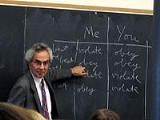
and Law
at New York University
, where he has taught since 1980. His main areas of philosophical interest are philosophy of mind
, political philosophy
and ethics
. He is well known for his critique of reductionist accounts of the mind in his essay "What Is It Like to Be a Bat?" (1974), and for his contributions to deontological and liberal moral and political theory in The Possibility of Altruism (1970) and subsequent writings.
Nagel was born July 4, 1937, in Belgrade
, Yugoslavia (now Serbia) to a Jewish family.
The problem is one of opposition between subjective and objective points of view. There is a tendency to seek an objective account of everything before admitting its reality. But often what appears to a more subjective point of view cannot be accounted for in this way. So either the objective conception of the world is incomplete, or the subjective involves illusions that should be rejected.![]()
Eventually, I believe, current attempts to understand the mind by analogy with man-made computers that can perform superbly some of the same external tasks as conscious beings will be recognized as a gigantic waste of time.![]()
Everyone is entitled to commit murder in the imagination once in a while, not to mention lesser infractions.![]()
If sub specie aeternitatis [from eternity's point of view] there is no reason to believe that anything matters, then that does not matter either, and we can approach our absurd lives with irony instead of heroism or despair.![]()

